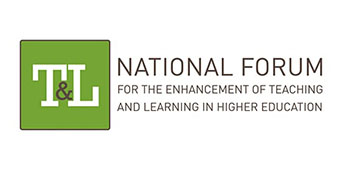SATLE2 Project
This Strategic Alignment of Teaching and Learning Enhancement (SATLE2) project was initiated back in November 2020.
TU Dublin successfully received a grant of €575,000 to enhance teaching and learning, to enable the development of a strong foundation for the future enhancement of teaching and learning within TU Dublin.
Download our SATLE2 Project Introduction Slides
| Phase | Description | Date |
|---|---|---|
| Stage 1 | TU Dublin initial submission for SATLE 2020 funding | November 2020 |
| Stage 2 | Provisional grant of €575,000 awarded | Early 2021 |
| Stage 3 | TU Dublin detailed application for funding to National Forum | July 2021 |
| Stage 4 | SATLE2 Project Kicks off | September 2021 |

SATLE2 Project Work Package Leads

Cormac MacMahon (Lead), Maurice Mark Boland, Geraldine Gray, Deirdre Lawless
SATLE2 Project Support

Madhav Bhargav
The strategic focus of this call is Transforming Teaching and Learning for Student Success. Student success, as the outcome of a quality education, is central among the four key strategic priorities of the National Forum. While success has been shown to mean something different to each student, underpinning all aspects of student success are the learning with which students engage and the teaching that supports this learning.
Responding to the challenges of the pandemic
This call represents an opportunity to support the higher education community to consolidate any positive disruptions to process and practice that occurred in 2020, with a view to enhancing efforts towards holistic approaches to enabling student success
Total Funding
A total value of €5m represents a significant commitment to the enhancement of teaching and learning in Irish higher education. The directed funding allocation to each eligible institution from this fund is designed to enable the development of a strong foundation for future enhancement of teaching and learning within each institution in line with local priorities.

Video: Dr. Mary Meaney (TU Dublin Registrar and Deputy President)
- Introduce and explain the importance of the SATLE2020 project and the alignment of SATLE with our TU Dublin Educational Model
| Work Package Lead | Work Package Objectives |
|---|---|
 Maurice Mark Boland |
Objective 1: Pilot and evaluate a digital skills diagnostic tool for staff and students to self-assess their digital capabilities.
Objective 2: Develop and curate a repository of learning resources that can be accessed by staff and students. Objective 3. Develop and pilot a dynamic peer mentoring scheme for students.
|
Achievements To Date:
- Procurement of a two-year subscription for a TU Dublin digital skills diagnostic service called The JISC Discovery Tool
- Contract from January 2022 to 31st of July 2023
- Technical integration and setup of the JISC Discovery Tool with our TU Dublin authentication system (TU wide login)
- We conducted a pilot launch of JISC with students, staff (both academic and professional services staff from the following areas:
- School of Languages, Law, and Social Sciences
- School of Computer Science
- Administrative Executive Assistant Group
- Development and creation of a Digital Skills Learning Hub database accessible on the TU Dublin website.
- The searchable database will consist of learning resources and online courses that can support the development of digital capabilities for both students and staff.
- We are currently in the final stages of assessing and collating external and internal resources for the Digital Skills Learning Hub database.
- Creation of a TU Dublin Digital & Technology services concept and design for an interactive hub on the TU Dublin website.
- National Forum teaching and learning event (Nov 2021) ‘Recognising past present & future challenges & opportunities of blended Teaching & Learning’
Future Work for 2022-2023 (project close out activities)
- Complete the Digital Skills Learning Hub database content creation/collation for internal and external resources (June 2022)
- Evaluating over 300+ internal and external digital skills resources against a define scoring evaluation matrix
- Creation of a content management process for internal digital skill resources.
- Roll out of a TU Dublin website hub for digital skills tools, resources and more.
- Launch of the TU Dublin digital skills diagnostic tool (JISC) for new intake of students in September 2022 (post project Sep/Oct 2022)
- Launch Digital Skills AI (Artificial Intelligence) bot for students and staff – available on TU Dublin website.
Future Funding Opportunities – Digital Transformation and Digital Skills:
‘’A dynamic new model of education producing the most sought-after digitally literate graduates, will be embedded in the University, transforming the learning opportunities and experience for all’’ - TU Dublin 2030 Intent
This workstream has shone a light on the importance of Digital Skills services and supports for our students and staff. As new emerging technologies change how we and our students engage with technology, the need for digital skills is of utmost importance for students, graduates, and researchers in this modern technological society.
Based on a comparative review conducted during this workstream, TU Dublin has a low to early developing maturity in relation to digital skills development services and supports, compared with other Universities across Ireland and overseas.
Therefore, we recommend future funding or operational investment in the following areas:
- The development of a TU Dublin Digital Skills strategy – clearly defining our strategic plan (short, medium, and long term) for delivering digital skills services and supports for students and staff.
- Development of a TU Dublin Digital Literacy framework - we define what digital skills capabilities are important for our students and staff in TU Dublin.
- The Digital student, Digital graduate, Digital researcher – equipping our students with the digital skills they need to learn, teach, and work in a modern digital society
- The Digital Educator – equipping our educators with the digital skills to teach effectively online
- Digital Champion training and development programmes for staff (Digital Educators)
- Integrating digital skills into our curriculum - as defined by a digital skills strategic approach and framework (as stated above)
- Establish digital skills badging in line with new national and University badging policies and procedures
- A new dynamic peer mentoring scheme where students can work alongside a digital skills buddy.
- Further development of modern digital skill resources, tools for students and staff.
| Work Package Lead | Work Package Objectives |
|---|---|
|
Dr. Geraldine Gray |
The aim of this workstream was to build on current and previous pilot projects in learning analytics (LA) to identify sustainable and scalable uses of data that offer insights to a variety of stakeholders enabling evidenced based decision making to enhance student success. The stream had two objectives:
|
These objectives were addressed via three deliverables:
- Investigate the institutional readiness, technical infrastructure and capacity for learning analytics that supports TU Dublin strategies, ethos, and educational model.
- Adopt a stakeholder informed LA analytics policy for TU Dublin.
- Develop training resources that enact our stakeholder informed CPD framework for Learning Analytics, developed in collaboration with GMIT, to support students and staff engage with data analytics.
Achievements To Date
- A draft learning analytics policy was developed, in adherence to LA policy guidelines from the National Forum for the Enhancement of Teaching and Learning and from JISC[1]. TU Dublin’s Academic Regulations, Policies and Procedures Oversight Committee has approved the policy for submission to Academic Council. It is scheduled for consideration in June 2022.
- JISC (UK) are working with TU Dublin on a Discovery Service to advise on appropriate uses of data analytics for TU Dublin, and develop an implementation roadmap. Jisc will interview key institutional stakeholders, including students, over the coming months. This will identify TU Dublin readiness, resource implications, capability, cultural impact and indicative timescales for the deployment of learning analytics. Their resulting report, to be completed by Q3 2022, will address the business case for learning analytics at TU Dublin.
- Some student and staff facing training content has been developed, clarifying ethical and legal uses of data for learning analytics. Quotes are being evaluated to develop OERs from this content. It is envisaged that these OERs will be deployed as part of the digital resources hub developed by the Digital Skills work package of this project.
Dissemination and Outcomes
- Work todate was presented at Educational Explorers: Mapping the future of Learning at TU Dublin, May 6th
- The JISC report is a potential input for the data infrastructure planning phase of the Educational Model project.
Future Work for 2022-2023
The phased implementation of the learning analytics roadmap delivered by this project will be a multiannual project. Early decisions include prioritising aspects of the roadmap that are deemed feasible, worthy, and can be resourced. Early evaluation of the role of both inhouse development and third-party solutions and services is also needed.
While the JISC report will investigate readiness for learning analytics, any decisions to proceed with their recommendations will need to support the cultural, technical, and operational impacts of increased use of data analytics. This includes extending the CPD resources developed to date. Ongoing research and evaluation of data insights is also warranted as education provision continues to evolve in the coming years, such as student recommender systems to support more flexible learning pathways, assessing complex transferable skills like ways of thinking and sustainable development, and feedback on learning to support greater use of formative assessment.
A core tenet for successful learning analytics initiatives is to protect, and be seen to protect, the rights of all individuals involved, including an ethos that recognises “not everything that can be measured counts, and what counts can’t always be measured”. Attention must be given to ensuring that technology, and the downstream accommodations it affords like learning analytics, supports rather than constrains teaching and learning innovation.
JISC is a not-for-profit organisation, funded by the Higher Education Funding Councils in the UK, to empower the higher education (HE) sector with the technology and data needed to succeed.
| Work Package Lead | Work Package Objectives |
|---|---|
|
Dr. Deirdre Lawless |
To design, create and evaluate:
|
Achievements To Date
- Discussions held with key stakeholders in TU Dublin about authentic assessment and its role in the educational model
- Hosted a successful National Forum event (Nov 2021) as part of VIT&L Week: ‘Embedding Global Citizenship in TU Dublin Programmes: Starting a Conversation”
- Captured and made available as an OER.
- Creation of Operation Kaizen Scholarship programme focusing on authentic formative assessment developed and launched
- Eight scholarship projects launched and successfully completed
- Launch event for Kaizen held with keynote from Prof. David Carless: ‘Towards productive teacher-student partnerships in feedback processes’.
- Outcomes from Kaizen projects currently being collated into OERs and final dissemination planned.
- Collaborative publication on experience planned (aim for September 2022).
- Designed data collection mechanism using workshops/focus group to examine elements of authentic assessment with TU Dublin Staff and students.
- Based on Ashford and Rowe’s1 eight elements of authentic assessment (challenging, form of a performance or product, transfer of knowledge, metacognition, accuracy, environment and tools used, opportunities for provision and discussion of feedback, collaboration).
- A number of focus groups held, more scheduled before June 2022.
- Materials designed so that they can be used at a school level –a group of TU Dublin staff from a range of disciplines are willing to run workshops/focus groups at school level.
- An offline mechanism has also been which can be used to widen participation.
- Two posters created about the workstream for the Education Explorers Event
- Posters from individual Kaizen Scholar projects also included.
- Publication on process and outcomes planned (aim for December 2022).
Future Work for 2022-2023 (project close out activities)
- Creation of searchable resource based on characteristics of authentic assessment (June 2022)
- Operation Kaizen Showcase (September 2022)
- Sharing experience and publicizing OERs
- Continuing workshops/focus groups @ discipline level (September 2022)
- Focus group with students
- Full data analysis to be conducted.
- Call for exemplars of authentic assessment practice aligned to characteristics (October 2022)
- Planned publication with Kaizen scholars (submission September 2022)
- Planned publication on outcomes of work stream (submission December 2022)
| Work Package Lead | Work Package Objectives |
|---|---|
|
Dr. Cormac MacMahon |
This work-stream stream builds on pilot education-for-sustainability initiatives, funded under TU Dublin IMPACT and Transform EDU projects- namely [i] sustainability literacy, [ii] education for sustainability CPD and [iii] sustainability in the curriculum. It aims to scale these initiatives in the formation of a university-wide capacity building provision that would empower faculty to transform their education programme portfolios and enable our graduates to become sustainability literate and globally responsible citizens. In doing so, this work package contributes to the planetary pillar to Dublin’s strategic intent, as catalyst for curricular reinvention.
|
Achievements To Date:
Project funding has facilitated SDG literacy to emerge as a flagship community of practice within TU Dublin. Almost 4,000 students have completed the Sulitest as an embedded assessment across TU Dublin and there are over 100 members of academic staff registered as Sulitest examiners. Sulitest was also taken by the university executive team in January 2022 through a workshop delivered by the VP for Sustainability. Cormac MacMahon and Olivia Freeman have become fellows of the international Sulitest community and work has begun on international standard Certificate in Sustainable Development. A team of staff from TU Dublin, GMIT, UCC and DCU has formed to develop the Irish specific module for Sulitest. A similar team has formed to develop an Introduction to Education for Sustainability digital badge for the National Forum, which will modelled along the lines of the UDL digital badge. Two open education resources (OERs) were launched [1] SDG1 – No poverty, and [2] learn French with SDG 12, both of which are available on www.sdgliteracy.ie . Several disseminations were delivered through the 2021-2022 academic year, including:
- Walsh, L., Freeman, O., McAlpine, A., Nolan, C., Duffy, D., MacMahon, C.H. 2021. Sustainability Literacy through Authentic Assessment. National Forum VIT&L Teaching & Learning Showcase in November 2021.
- Freeman, O., Duffy, D., McAlpine, A., Nolan, C. MacMahon, C. and Walsh, L., 2021. Exploring the impact of authentic assessment on sustainability literacy through reflective and action-oriented tasks: A roundtable podcast, Irish Journal of Academic Practice, 9(2), Article 7.
- Freeman, O., MacMahon, C.H., Walsh, L., 2022. Enhancing SDG Literacy through Authentic Assessment Strategies. QUB Annual Learning and Teaching Conference.
- Freeman, O., MacMahon, C.H., 2022. Sustainability Literacy and the Sulitest Workshop, Northwest Regional College, Learning and Teaching Symposium]
SDG Literacy submissions have been accepted for the Advance HE Island of Ireland symposium and PS2022 in Dramstadt. SDG Literacy was a major contributor to Green Week in March 2022, with the provision of guest-speakers: Prof. Zoe Robinson, Prof. Aurélien Decamps and Malcolm Goggins, ABEC.
Two cycles of the Education for Sustainability modules were delivered in the academic year 2021-2022, in which 100+ undergraduate students, 20+ PhD students and 80+ staff will have completed. VP for Sustainability, Jennifer Boyer, presented the first cohort of students with their CPD certificates during Green Week, March 2022. Over 60 recordings of guest-speakers from academia and industry have been curated for editing as open education resources (OERs) to be licenced under creative commons. An instructional designer from Convene is currently preparing the videos for production and it is intended to launch a new portal for resources in September. Through Convene, TU Dublin is collaborating with the Irish Exporters Association on a pilot offering of the PG Certificate in Sustainability Leadership, with intention to launch in September as professional development for the IEA membership. Jesus Frias and Cormac MacMahon provided training to PhD students as part of the Graduate Research School provision.
The project team has also contributed to development of funding applications for new academic programmes, including a Certificate in Sustainable Finance and the PG Diploma in Sustainability Leadership. Based on the initial pilot of the Education for Sustainability in 2020-2021, the School of Food Science and Environmental Health has been successful in securing Erasmus+ funding for a project to develop food sustainability competencies through service learning https://www.nemosproject.com with TU Graz, Pisa University and the public University of Navarra.
The systematic evaluation of the embeddedness of sustainability in the curriculum efforts continue to progress in 2021-2022. A computation approach to measuring the embeddedness of the SDGs in the curriculum has been submitted to Frontiers in Sustainability journal for publication (currently in review). Exploratory talks with our programme module catalogue provider, Akari, are ongoing with the intent to submit for further funding, through the Enterprise Ireland innovation partnership scheme, to commercialise. Three programme teams have now beta-tested the computational approach as part of their efforts to enhance the sustainability components in their curricula.





